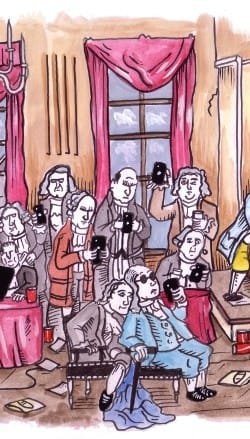Who’s Reenacting the Constitutional Convention on Twitter?


Disclaimer: It was suggested I go up for the role of John Dickinson “Penman of the Revolution” because of my desire for consensus (what I call the GREATER Overlap.)
It is called @TweetTheDebates and it is the brainchild of Toby Grytafey: Artist and legal services attorney. Toby has defended tenants and wrote legislation and regulations, as well as created art installations for festivals with TiMe To Productions and won an EPA video contest - “Rulemaking Matters!” Toby believes it necessary to combine the two sides of his work and find ways to engage people, politically and creatively.
Toby came up with the idea for Tweet the Debates after stumbling across James Madison's Journal of the Debates in the beautiful Toledo public library (recently tied for fifth in a study of literate cities) while researching another project. He was far less familiar with this journal than the oft-cited Federalist Papers. Toby told me…
“I hope Tweet the Debates can be both a useful study resource and an opportunity for a fun way to engage people in a non-partisan conversation about how we should govern ourselves.”
From May to September in real time, the actual events of the Constitutional Convention will be recreated one tweet at a time on twitter. A monumental amount of research has been done preparing the “script” of 2800 pre-tweets that the twitter actors will then improvise with characterizations in—140 characters. Toby also used Gordon Lloyd's excellent resources about the Convention.
This is no less than “play-ing” with the fundamental questions about our government—using the source material of those who actually did the creating. Think of it as the hot summer mini-series for the politically minded.
What are States’ Rights and Responsibilities and which are Federal’?
Personally, I tend to lean locally conservative and nationally progressive. When I’m with my liberal friends I am the most conservative person in the room. Vice versa with my conservative neighbors. Some ask how the two views can be compatible? The answer is: the United States has a monopoly issuing a sovereign floating rate currency in which it collects tax. Before you can spend a dollar, the US government has to spend it first. However, states, towns, businesses, and households have to balance their budgets, they don’t spend money into existence (they can borrow it that way but it has to be paid back or bad things can happen like the housing bubble). So how should the Federal government’s rights and responsibilities find balance with the States’. This is a Republic, it says so in the Constitution. Did the founders wrestle with these issues? Of course they did, and Jefferson’s and Adams’ arguments are still as valid today as they ever were.
I asked Toby, how the reenactment will work…
“TweetTheDebates is recruiting a diverse group of Twitter Actors. Law professors, rappers, civics teachers, hackers, well-followed Tweeters, judges, popular meme artists, and more are being offered an opportunity to play a role as a delegate to this Twitter Convention. The Twitter Actors will create a character with these tweets, and people can follow along on Twitter. Or they'll be able to read feeds along with additional info at tweetthedebates.com, without a Twitter account.”
Did I mention, I’m up for the role of John Dickinson? Thomas Jefferson said this upon hearing the news of Dickinson’s death,
"among the first of the advocates for the rights of his country when assailed by Great Britain" whose "name will be consecrated in history as one of the great worthies of the revolution."
Pre-Convention Wonk
Before the Convention, @TweetTheDebates is tweeting the hashtag #1787Problems - describing the Articles of Confederation, Shays' Rebellion, and the other reasons behind a call for a Convention. The www.TweetTheDebates.com website is adorned with a quote from a letter to John Adams in July 1786, written by Tristram Dalton:
“No people ever had a fairer opportunity to be what they anxiously wished to be – none ever neglected their interest more.”
Obviously, a metaphor for our time. I often say, we as reformers have reached a critical mass to affect any changes we desire, we just won’t work together to separate which reforms are actually doable—today, from those that will take decades—if ever. By following @TweetTheDebates you can see HOW THEY FINALLY STOPPED TALKING ABOUT IT AND JUST DID IT!
After the Convention. Tweet the Debates will continue its life on the internet after the signing on September 17th. Students and teachers can use the fun, sortable guide to the Convention. The open source web app can be adapted by others for their own online deliberations.
To find out more about @TweetTheDebates please visit www.tweetthedabates.org. To find out more about the GREATER Platform, stay tuned here at IVN. >



